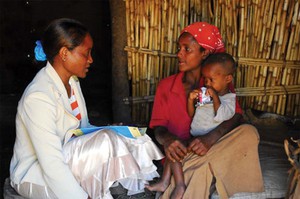Health Extension Workers (HEWs), are usually graduates of Technical and Vocational Education and Training Colleges (TVETCs) or Health Science Colleges. They are trained to promote preventative healthcare practices among communities, undertaking community outreach activities and conducting house-to-house visits to provide important information, knowledge and skills on important health-related topics.
HEWs undertake 16 essential health packages that can be grouped into three key areas:
- disease prevention and control
- family health
- hygiene and environmental sanitation.
Promotion of safe and healthy practices in relation to infant care, nutrition, immunisation, growth monitoring for babies and family planning advice are among the many services in the first two areas above that HEWs undertake. They provide these services during house-to-house visits or at health posts or health centres. Here we focus on their hygiene and environmental sanitation work.
The health packages that relate to major WASH issues are:
- Excreta disposal: Human faeces is a major health risk (Study Session 2). HEWs provide information and guidance on how human excreta can be safely managed and disposed of through the construction and use of appropriate latrines.
- Solid waste and domestic liquid waste disposal: HEWs discuss health and environmental issues caused by solid and liquid waste produced at household level, their risk to community health, and how they can be safely managed.
- Water supply and safety measures: Contaminated water is a major cause of transmission of waterborne diseases that cause diarrhoea. HEWs explain how water can be handled safely to avoid contamination during transport and storage and how contaminated water should be boiled or treated using chemicals.
- Food hygiene and safety measures: Food can transmit disease if proper hygiene and safety measures are not practised. HEWs demonstrate safe practices for preparing and storing food.
- Healthy home and environment: HEWs demonstrate how family members can take care of their home and its surroundings to ensure a clean and safe environment.
- Control of insects and rodents: These are not only a nuisance, but may also transmit diseases. HEWs teach possible methods to control and prevent the breeding of these animals in and around the household.
- Personal hygiene: Finally, HEWs promote the importance of keeping and maintaining good personal hygiene, particularly emphasising handwashing before coming in contact with food and after using the latrine, and the importance of washing faces to protect from eye infections.
HEWs promote all these recommended practices in urban communities (Figure 7.1). They work to ensure that all health extension packages are implemented at a household level, including the seven listed, through training of model families. They may use youth associations and traditional cooperative associations such as idir, ekub and mahiber to promote community involvement. They also work with students in schools to promote proper sanitation and hygiene practices.

Figure 7.1 A HEW giving advice to a mother.
